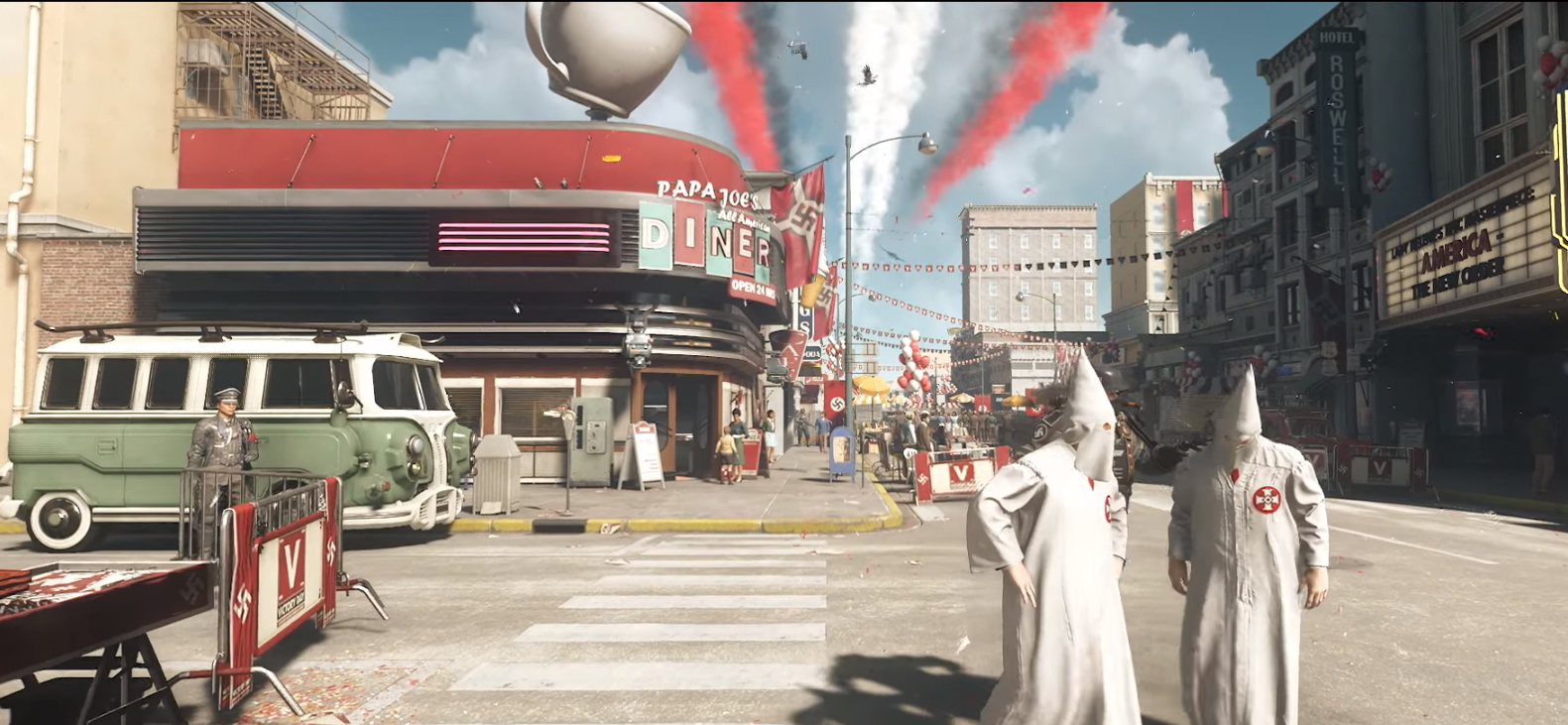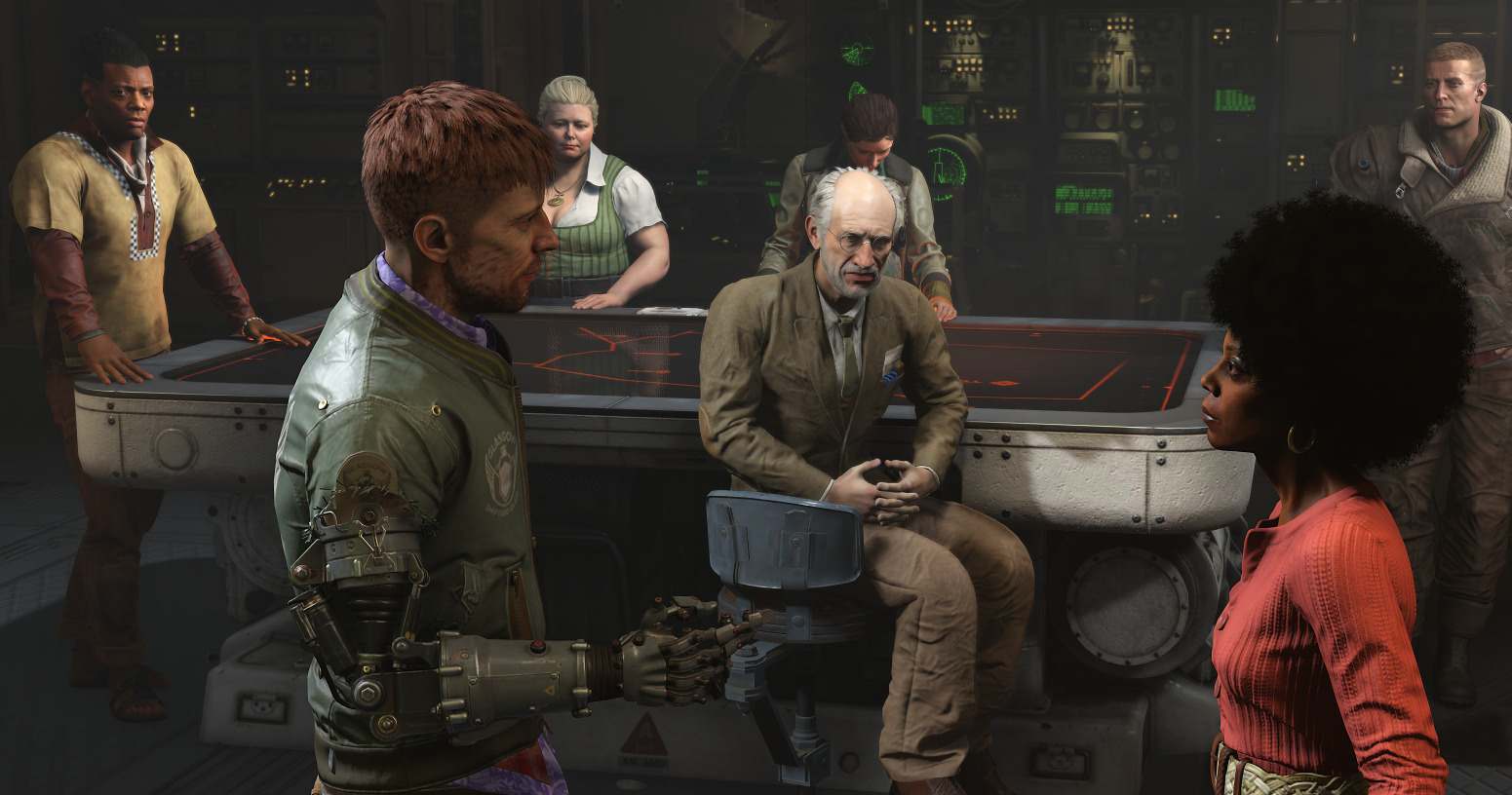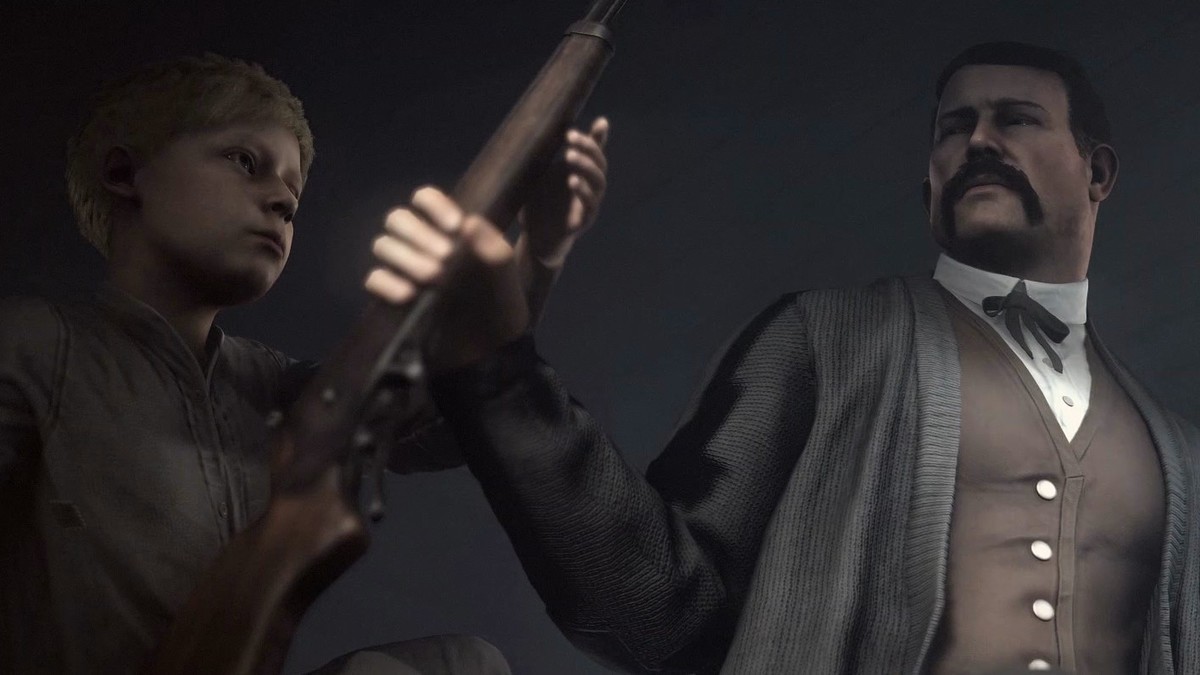What we thought of Wolfenstein 2's big twist and its dark vision of Nazi America
Have you finished Wolfenstein 2: The New Colossus? Let's talk.

Two of our editors have finished Wolfenstein 2: The New Colossus, and now that a few days have passed since the sequel's release last Friday, Sam and Evan sat down to discuss what they thought of its alternatingly dark and silly story, combat, and plot twists.
Evan Lahti, US Editor-in-Chief: Sam, you reviewed Wolfenstein 2: The New Colossus for us, and now that I've finished it too we can engage in a lively, spoiler-filled discussion of its absurd alternate history and hyperviolence.
Samuel Roberts, UK Editor-in-Chief: Indeed. I mostly enjoyed the story, particularly the characterisation of the game's larger cast on your u-boat. Stopping to witness new interactions with them between levels is a treat. The alternate history setting was vivid, weird and horrifying at the game's best, but they probably could've shown you more of it.
Evan: I wanted more of that too. Wolf 2 feels like a case of the game's marketing pulling disproportionately from a visually-interesting area of the game—Nazi America—and in the process misleading us about how substantial that is.
Samuel: A big deal was made of the game's Roswell/Galveston level, where you explore a small town during a Nazi march. It's probably the most interesting snapshot of everyday life in Wolfenstein 2's alternate universe, and it maybe totals 20 minutes out of the game's 10 hours. Then you're back in generic corridors and ruins shooting Nazis. I would've loved maybe two or three more hubs like that. What does San Francisco look like now? Or could we see what a more civilised district of New Orleans looks like? In the latter's case you don't get much of a sense of the place outside of a swamp at the start and jazz during the cutscenes when you meet that resistance group.

Evan: But hey, the u-boat has a lot of character. The early plot point of having Nazis hiding on the ship in a secret section was clever—I liked finding their desperate letters to their German wives on the ship. And on the main decks, the cast of resistance fighters are good comedic relief from Wolfenstein 2's brutality. Debra Wilson gives a great performance as Grace Walker. I remember around 2013 or 2014 we'd complain often about story-driven games being so serious. Wolf 2's weirdness is a big reason I enjoyed it so much. Finally, an FPS that's cool with sending pregnant women to fight robots on Nazi air carriers.
"I feel like there's more to tell here with BJ and company. Frau Engel is dead, but surely the next chapter is the full-on revolution."
—Samuel
Samuel: Yeah, I love that you can still find games like this. I could play new Dooms and Wolfenstein until the end of time, and I hope Bethesda keeps bankrolling them. That's much more interesting to me as a player than dozens of expensive-looking multiplayer games with cartoon-y character designs that find no audience and are quickly forgotten (though we can have both, of course). Whether the market tells that story or not, I have no idea, and I suppose that's not my problem until this type of game goes away.
Keep up to date with the most important stories and the best deals, as picked by the PC Gamer team.
Evan: OK, let's talk about one of the big moments in the game—this is our readers' chance to avoid über spoilers, if they've made it this far without playing.
The execution scene is incredible. I think BioShock was last time I found a plot twist that gratifying. It was pure emotional whiplash: you kill your stepdad, you're captured, you heroically fight your way out of the damn courtroom during your trial, psych—that was a fantasy—and now you're being beheaded on TV. ...Wait, am I really, actually dying? Yeah, it seems like this is really happening. And it's clumsy, ugly, and I'm experiencing every moment of it. BJ's low point was my high point of the game.
Samuel: Having played the game for five or six hours in a row at that point, I felt like I was dreaming. They just plugged wires into his head to save him? Of course they did. It's bloody Wolfenstein.
Evan: We and a lot of other critics have praised games like Dark Souls and XCOM that handle death and failure in interesting ways. Usually that means a mechanic, though, rather than a plot twist. Here, there's a profound feeling of failure—you're watching the apparent last hope of humanity's head get chopped off. It does what good fiction does—for a moment, you have zero answer to the question "How the hell are they gonna get out of this one?"
Samuel: And it's certainly an interesting way to introduce upgrades into the game. I like that it marks a turning point in BJ's attitude towards life and death—the certainty of his demise turns into hope.
Evan: I honestly couldn't take much more of that 'gloomy, battered-soldier Billy' monologuing. And what did you think about all of the 'parents of weak children' stuff? It's established as a theme right at the outset with BJ and with Frau Engel and her daughter too.
Samuel: Yeah, I wasn't convinced by the way they built on BJ's background with his abusive father and victimised mother, in all honesty. It felt like surface-level exploration of a pretty serious subject, just to make sure the player knows everything around them is as horrible as it possible in this world. I felt like they could've spent more time digging into this, instead of giving BJ this caricature of an abusive/racist father who's in three or four cutscenes, then gets fucked up with a hatchet before the house is literally picked up by Nazis.

Evan: I didn't hate it. I liked that they made time for BJ's backstory during a continental war.
Samuel: I guess making him so reprehensible and over-the-top is in line with the game's presentation generally—this is Wolfenstein, after all—but domestic abuse and racism deserve a bit more than being treated as superficial details. It's not that I don't think these themes shouldn't be in Wolfenstein 2—I just think they should've given them more time and nuance to justify their inclusion. They're not quite earned for me in a game where the storytelling is otherwise extremely good.
Evan: But hey, I sure did like crawling around those pristine Nazi bases.
Samuel: Yeah, I'm not sure what your experience was, but in most cases I'd sneak for as long as I could before getting caught and unleashing all hell. I reckon I killed about 25% of the game's officers in full stealth—which I'm happy enough with.
As the game went on, I was let down by the design of the special 'components' BJ unlocks.
—Evan
Evan: Nice. I think the silenced pistol is the second or third best gun in the game, after the heavy laser. One-shotting those officers feels like defusing a bomb from a distance… a racist bomb. But I still find cycling guns while dual-wielding to be a nightmare, and I don't like the radical gun menu at all. More importantly, there were moments on my difficulty level, "Call me Terror-Billy!" (does a game really need seven difficulties?), when Wolf 2 taxed my FPS skills and forced me to improvise my way through waves of reinforcements. The resistance base escape sequence in Manhattan was definitely one of those.
Samuel: It's slightly too tricky to play in full stealth without tons of quicksaving and reloads, which I might do on another playthrough with more time. I loved the larger environments, though—great venues for a firefight. I wish they looked a bit more vibrant, though. Most of the time you're fighting in generic military bases, rather than feeling like you're in some twisted version of America.
Evan: I thought the bases were nicely detailed, actually—every control panel and workstation looked lived-in and authentic, unlike the dull ruins of New Orleans and Manhattan. Combat-wise, more than anything I wanted some more intimidating bosses. The pair of Reichbots you fight at the end of the game are a total letdown—I didn't like the level layout for that section, how I could hide underneath and pop out like a prairie dog.
Speaking of bosses: Why didn't we get to kill Hitler? Will they revisit it in the DLC?
Samuel: Yeah, maybe. I tried three or four times to see if I could somehow sprint to the nearest guard and melee them after booting Hitler in the face, but no luck. Also, wouldn't BJ try and blow up the base on Venus instead of just leaving?
Evan: It was supposedly an HQ for top brass, but hey, not every base can have a convenient auto-destruct sequence, Sam.
Sam: How did you feel about the Hitler scene generally? I found it at times both a bit horrible and amusing, which is almost certainly the point. I never figured out how I felt about the breakneck tonal variance in this game—I'm somewhere in the middle, probably. Wolfenstein is having its cake and eating it, here—Hitler references the real-life dictator's ideologies while having a piss, and there BJ is in a comedy mustache doing a bad job of pretending to be himself. I'm amused and yet ever-so-slightly put out. Machinegames creates this feeling then leaves the player to figure out how they feel about it, for better or worse.
Evan: If anything, I think they deliberately wanted to avoid mirroring the end of Inglourious Basterds. Like Tarantino's film, you've got Hitler involved in the production of a movie—it's halfway there. But yeah, I guess the thing that rubbed me the wrong way is that Hitler's depicted as senile, which portrays him as a deranged, broken Nazi grandpa rather than simply evil. You also can't kill him, although there's a consolation 'cheevo for trying.
Sam: It's an unforgettable moment, at the very least. I just wished the sub-Doom Venus level that followed was more fun. Nothing took the wind out of my sails more than having to cool down BJ's suit every 60 seconds. This didn't really add anything to the game other than slowing it down.
Evan: And as the game went on, I was let down by the design of the special 'components' BJ unlocks. Wherever BJ had to crawl through a tiny vent, there was almost always a spot for him to bust through a wall or use the Inspector Gadget stilts. What's the point of unique gadgetry if they're all effectively the same? A missed opportunity for some weirder level design.
Samuel: Yeah, the seams are very obvious in that regard.
Evan: I did like the Oberkommando missions a lot, though—I like that I'm free to go through them at my own pace without any burden of story. It's a clever structure that lets you finish the story when you want to.
Samuel: Yeah, I like these too, although in some cases you feel like you've seen more than enough of the same environments from the story. Either way, they add more value to the game for people who want more of Wolfenstein 2's stealth/action loop. I like that you can use them to go back and get the extra contraptions, although when I came across this option it was far too deep into the story to really get any use out of them. And the ram shackles contraption is the most fun one, really.
Evan: I'm really curious how the season pass stuff, "The Freedom Chronicles," is going to slot into this.
Samuel: But they've already confirmed they're about non-Wolfenstein 2 characters, right? I feel like there's more to tell here with BJ and company. Frau Engel is dead, but surely the next chapter is the full-on revolution that the game has only really teased by the start of the closing credits? Maybe that gets saved for Wolfenstein 3. I hope there is one.
Evan: Me too. As much as we clearly didn't love everything, this should end up being my favorite singleplayer FPS of the year. And I don't love that more of Wolf is being meted out as DLC, but I'm certainly going to play all of it.

Evan's a hardcore FPS enthusiast who joined PC Gamer in 2008. After an era spent publishing reviews, news, and cover features, he now oversees editorial operations for PC Gamer worldwide, including setting policy, training, and editing stories written by the wider team. His most-played FPSes are CS:GO, Team Fortress 2, Team Fortress Classic, Rainbow Six Siege, and Arma 2. His first multiplayer FPS was Quake 2, played on serial LAN in his uncle's basement, the ideal conditions for instilling a lifelong fondness for fragging. Evan also leads production of the PC Gaming Show, the annual E3 showcase event dedicated to PC gaming.

